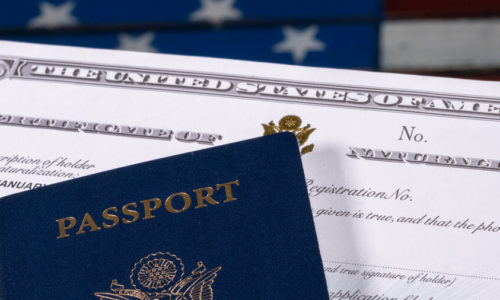Attention: You can seal or expunge your criminal record in Florida if you have ever been arrested for a criminal offense.
*In Florida, a criminal conviction (any offense in which you were found guilty or pled guilty) will disqualify you from sealing your record with very few exceptions. Consult with your Spiriti & Caserta Attorney for legal options available if you have been convicted of a crime.
A Criminal Record Can Make it Hard to Find or Do Any of the Following:
A Good Job
This affects you and your family’s financial well-being.
Housing
Mortgages and rental approvals are more challenging and can even affect the quality of the schools your children attend.
Travel
A criminal record can even ground you from traveling outside the United States.
The entire process of sealing or expunging your record can take from 8-12 months. Our firm will be by your side every step of the way and will return your attorney fee if the court does not seal or expunge your record after you have been cleared by the Florida Department of Law Enforcement (FDLE).
1
Application:
Properly apply for a Certificate of Eligibility from The FDLE. This will account for the bulk of the wait time. Any mistake could cause huge delays in processing your application.
2
Prepare Case and Petition The Court:
If the FDLE grants your Certificate, one of our qualified attorneys will get it on the calendar of a Court of proper jurisdiction for The Court’s approval.
3
Court Appearance
Our attorney will represent you in court, even in your absence, and seek to obtain an order sealing or expunging your criminal record forever.
Take Your Future Into Your Hands and Open New Doors:
In many cases, a Florida record sealing allows you to legally deny that you have a criminal record and even prohibits certain employers or organizations from considering it in a job application.
Become eligible for student or other kinds of loans and professional and trade licenses for which you previously could not qualify.
Remove the stigma from family and friends and replace it with a fresh start and new outlook.
[INSERT_ELEMENTOR id=”3103″]
1. How much does it cost to seal or expunge my record with Caserta & Spiriti?
The firm can begin the process of sealing or expunging your criminal record with a flexible payment plan. But if you want to save money, we recommend an all-inclusive payment of $1,250 upfront to get your case started right away. Email us at info@csgfirm.com, click on our chat, or call us and one of our legal staff members will facilitate processing— we accept all methods of payment. You can also request a free legal consultation with one of our criminal defense attorneys on your sealing or expungement matter.
2. Is there a money-back guarantee?
Yes. Although no law firm can guarantee a successful outcome, Caserta & Spiriti Attorneys at Law will return your legal fees if your request to seal or expunge your criminal record is denied by the court of jurisdiction after a Certificate of Eligibility has been granted by the FDLE. The refund will not include the $75 FDLE application fee or the $150 legal research fee the firm charges to prepare your case.
3. How do I have a criminal record sealed or expunged in Florida?
Sections 943.0585and 943.059, Florida Statutes (F.S.), set forth criteria that must be met in order to be eligible to have an adult or, if so desired, juvenile criminal history record sealed or expunged by a court. In addition, these statutes require a person who wants to petition a court to seal or expunge his/her criminal history record in Florida, to first apply to the Florida Department of Law Enforcement (FDLE) for a Certificate of Eligibility. (As the name implies, this document certifies that the record is statutorily eligible for sealing or expungement/expunction.)
The issuance of a Certificate of Eligibility does not mean that your criminal history record will, necessarily, be ordered sealed or expunged by the court. The granting of a petition for sealing or expungement filed by a statutorily-eligible petitioner is at the sole discretion of the court.
Under certain specified conditions, criminal history records may be eligible for expungement under other statutory provisions, with different requirements and different effects. See the response to Question #9 below. The criminal history record of a minor may also be eligible for other forms of expungement, as noted in Question #17 below.
4. Where can I find the application for Certification of Eligibility?
You can obtain an application for the Certificate of Eligibility by emailing us at info@csgfirm.com and requesting an application be emailed to you.
5. Why do I still have a criminal history record when the charges against me were dropped/dismissed/no action filed/abandoned/ nolle prossed?
Under Florida law, adult criminal history records are public unless sealed or expunged. The term “criminal history information” is defined, tracking the federal definition, in Section 943.045, F.S. A criminal history record is created when a person is arrested and fingerprinted, and includes the disposition of any charges stemming from that arrest, whether it is an adjudication of guilt or the withholding of adjudication, acquittal, or dismissal of charges before trial, or other disposition.
6. Should I obtain a copy of my criminal history record prior to applying for a Certificate of Eligibility?
Obtaining a copy of your criminal history, or seeking a personal review from FDLE, is not a prerequisite to applying for a certificate of eligibility to seal or expunge a criminal history record. Under Florida and federal law, an individual has the right to request a copy of his/her criminal history record for purposes of review, to ensure that it is both accurate and complete.
For arrests occurring outside the state of Florida, the FBI has a similar procedure to review a criminal history record.
7. What is the difference between a sealed record and an expunged record?
When a criminal history record is sealed or expunged, the public will not have access to it. Certain governmental or related entities, primarily those listed in Section 943.059(4)(a), F.S, have access to the sealed record information in its entirety. When a record has been expunged, most of the entities which would have access to a sealed record will be informed that the subject of the record has had a record expunged, but would not have access to the record itself without a court order. The response to a record search query from such an entity would be: “Criminal History Record Expunged Pursuant to Florida Statutes 943.”
8. When is my record sealed or expunged?
Once an order has been issued by a court of competent jurisdiction to seal or expunge your criminal history record and a certified copy of that order has been received by FDLE, the order will be complied with in accordance with applicable state law. The issuance of a certificate of eligibility does not seal or expunge your record. If you receive a certificate of eligibility, your next step will to be to file a petition, along with the certificate and affidavit, in a court of proper jurisdiction.
9. How many dates of arrest can I have sealed or expunged?
The eligibility criteria for sealing or expungement include the requirement that the applicant be able to attest that he/she has never previously had a record sealed or expunged, under Section 943.059, Section 943.0585, or previous versions of those statutes, in Florida. With respect to the relief offered by these statutes, a person may only seal or expunge one arrest record in one proceeding. More than one arrest record may be sealed or expunged in a single proceeding if the court, in its sole discretion, finds the arrests in question to be directly related.
A record that is initially ineligible for expungement (because adjudication was withheld) may become eligible after it has been sealed for 10 years. However, a person may not seal or expunge one arrest record and then, later and in a different proceeding, ask to have a different arrest record sealed or expunged.
10. What charges cannot be sealed or expunged??
A list of offenses that cannot be sealed/expunged when (even if adjudication is withheld) found in Section 943.059, F.S., and is included with the application package.
In addition, if a person has been adjudicated guilty (as an adult) of any criminal offense in any jurisdiction (or adjudicated delinquent, as a juvenile, in Florida for any felony or for certain specified misdemeanors), whether or not related to the charge(s) that the person is applying for, the record is ineligible for sealing and the application will be denied. FDLE conducts state, national, and criminal traffic records checks when processing applications.
11. After I have received my Certificate of Eligibility, what is my next step?
Once FDLE has issued the Certificate of Eligibility to seal or expunge a criminal history record, the next step is to file a petition for relief, along with the Certificate of Eligibility and the required affidavit, in the court having jurisdiction over the arrest (usually in the county in which the arrest occurred). The issuance of the Certificate of Eligibility is not the final step in the Sealing/Expungement process, nor does it guarantee that a criminal history record will be sealed or expunged. The final decision to seal or expunge your criminal history is placed by law in the sole discretion of the court and judge. Consult your attorney before appearing in front of a judge.
12. I had my record expunged years ago but I need a copy of my records. What can I do?
Typically, clients seek to unseal their old criminal records in immigration cases.
It is highly recommended that you obtain and keep a copy of all pertinent documents (arrest report and disposition, order to expunge or seal) for your records before you secure the sealing or expungement of your criminal history record. The arrest, once expunged or sealed, can only be viewed by order of the court. Consult your attorney if you seek to unseal or view your criminal record for any purpose.
13. Can I appeal (ask for judicial review of) the denial of my application for a Certificate of Eligibility to seal or expunge my criminal history record?
If you believe the denial of your application for Certification of Eligibility is in error, you may ask that the denial be reviewed.
14. If I receive a full pardon, can I have my criminal history sealed or expunged?
With respect to sealing or expungement under Sections 943.059 or 943.0585, F.S., unless the pardon indicates on its face that it entitles the record subject to seal or expunge his/her criminal history record, the granting of a full pardon does not remove any condition of ineligibility for sealing or expunging a criminal history record imposed by the disposition of the pardoned offense.
15. If I receive clemency, will my record be automatically expunged?
No. Neither a full pardon, nor any other type of executive clemency, will automatically expunge or facilitate the expungement of your criminal history record. Consult your attorney if you seek clemency in Florida.
16. If I have my civil rights restored, will my criminal history be expunged?
No. In order to have your civil rights restored you had to have been convicted (adjudicated guilty) of a felony that was the basis for your loss of civil rights. Persons who have been convicted (adjudicated guilty) of a felony are not eligible for an expungement or sealing of their criminal history regardless of whether their civil rights have been restored.
17. Do I have to apply for a Certificate of Eligibility to have my juvenile criminal history record sealed or expunged?
Florida juvenile records are subject to an abbreviated retention schedule, if certain qualifications are met, which results in the automatic expungement of the record after a specified period, under Section 943.0515, F.S., at age 21 or 26. Persons between the ages of 18 and 21, who meet certain conditions, may apply for the “early” expungement of their FDLE juvenile criminal history record. Juvenile defendants, who successfully complete a qualified diversion program, may be eligible for expungement of their record as the term is defined therein. If a person wishes to pursue the judicial sealing or expungement of his/her juvenile record, the eligibility criteria and procedure are found in Sections 943.059 and 943.0585, F.S.
18. If I have a criminal history record sealed or expunged in another state or jurisdiction, will I still be eligible to have a criminal history sealed or expunged in the State of Florida?
Effective July 1, 2013, a previous sealing or expungement of a criminal history record in a jurisdiction outside Florida does not, in and of itself, disqualify an applicant from having a Florida criminal history record sealed or expunged. Consult your attorney.
19. How long does it typically take to receive a response once I have submitted my Application for a Certificate of Eligibility?
The current processing time is over 120 working days (this does not include weekends/holidays or time required to conduct the investigation). All applications are processed in the order that the full and complete application for Certificate of Eligibility and all required supporting documents are received.
20. Will FDLE notify agencies involved in my case that the record has been sealed or expunged?
Yes. If the record is eligible and the court grants relief, FDLE will comply with the certified court order and seal or expunge the appropriate criminal history record and notify all relevant agencies in writing.
21. Why is the Florida Department of Highway Safety and Motor Vehicles checked to determine my eligibility to have my record sealed or expunged?
A criminal traffic offense, such as Driving Under the Influence, Driving While License Suspended/Canceled/Revoked, or Reckless Driving, may appear in the DHSMV database even though it may not be entered in the criminal history record system maintained by FDLE. Although non-criminal traffic offenses (such as careless driving) have no effect on eligibility to seal or expunge a criminal history record, an adjudication of guilt for any criminal offense renders the record ineligible to seal or expunge a criminal history record
22. Who should receive a copy of the order to seal or expunge a criminal history record?
If the record is eligible and the court grants relief, the Clerk of the Court by statute is responsible for sending a certified copy of the court order to the appropriate State Attorney’s Office or Statewide Prosecutor’s Office and the arresting agency or agencies. The arresting agency is then responsible for sending a certified copy of the court order to all agencies to which the arresting agency disseminated the criminal history information to which the order pertains. In addition to FDLE, these agencies may include state agencies such as the Department of Corrections and Department of Juvenile Justice.
23. If I have had my record sealed or expunged but my record is still showing up on the internet, what can I do?
A seal or expungement order may not eliminate all information about someone’s arrest and criminal history record from the Internet. For example, “mugshot” photographs and arrest information maintained on privately operated websites are not subject to an expungement order. Private companies collect information from a variety of online sources, governmental and commercial. However, once your criminal record is legally sealed, you or your attorney may have legal recourse to legally demand that this false or erroneous information be removed. Laws vary from state to state, and some entities are governed by federal law and not state law. Consult your attorney to continue the process of deleting your criminal history on the internet once your criminal record has been sealed.
24. What steps are required to successfully complete the FDLE application and receive a Certificate of Eligibility?
The Caserta Spiriti and Gonzalez Law Firm is committed to helping you complete every detailed step of the application process to seal or expunge your criminal record:
Completed Application Page
- The application page must be filled out in full including last name, first name, date of birth, race, sex, mailing address, permanent address, arresting agency, date of arrest, and charge(s).
- If you were given a Notice to Appear and not physically arrested, indicate the date of the Notice to Appear in place of the date of arrest.
- Applicant must sign the application in the presence of a notary public or a deputy clerk of the court.
Completed Written Certified Statement Page (Expunction Applications Only)
- For all expunction applications (including juveniles), the written certified statement page completed by the appropriate state attorney or statewide prosecutor is required.
Certified Disposition
- The applicant must provide a certified disposition of each case/criminal charge(s) listed on the application. This may be obtained from the clerk of court in the county where the case/charge(s) originated.
- If placed on probation, provide documentation showing termination of probation.
- For pre-trial intervention cases and other diversion programs, the applicant must provide a copy of the pretrial completion certificate or a letter of successful completion which may substitute for a certified disposition.
Completed Fingerprint Form/Card
- The applicant must be fingerprinted by an authorized member of law enforcement or other criminal justice agency.
- The fingerprint form/card must include the applicant’s name, date of birth, signature, and date.
- The fingerprint form/card must include the signature of the official taking the fingerprints and the agency’s ORI/stamp.
Processing Fee
- A NONREFUNDABLE money order, cashier’s check, or personal check in the amount of $75.00 made payable to FDLE must accompany the application. FDLE does not accept cash, gift cards, or temporary personal checks.
- Make sure to completely fill out and sign the check/money order.
- EXCEPTION: This fee is not required for juvenile diversion expunction applications.
Attorney Letterhead (if applicable)
- If you are represented by an attorney, a letter of representation from the attorney on letterhead must be submitted with the application. If an attorney letter is not received, FDLE will only correspond with the applicant.
- Make sure the appropriate mailing address is clearly indicated on the letter.
Crimes That Cannot Be Sealed/Expunged (Even if adjudication was withheld)
Arson
Aggravated Assault
Aggravated Battery
Illegal use of explosives
Child abuse or aggravated child abuse
Elder abuse of disabled adult
Aircraft piracy
Kidnapping
Homicide
Involuntary Homicide
Sex Battery
Stealing
Jacking Car
Lewd, lewd or indecent assault or act with a child under the age of 16
Sexual activity with a child older than 12 but younger than 18 years
Joseph Spiriti
Joseph A. Spiriti Jr., represents clients in general business matters, with specialized experience in contract negotiation, debt collection, business infrastructure and transactions, real estate, and entertainment transactions and litigation.
Read MoreDavid Caserta
David T. Caserta represents clients in general business matters, which include, but are not limited to, contract negotiation, business infra-structure and transactions, real estate.
Read MoreJoshua L. Fisher
Joshua Fisher, graduated from FAU with a BA in Philosophy, then got his law degree (JD) from Nova Southeastern University in December, 1997. He was admitted to the Florida Bar in 1998, and then to the Southern and Middle Districts of the...
Read More






